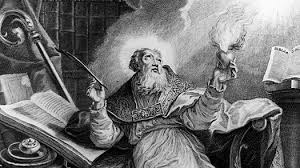Augustine the Manichean
One of those who struggled out of the character of that period toward an understanding of Christianity is to be seen in Augustine. In this Augustine we see a spirit who could no longer understand the ancient form of the conception of nature. You know that Augustine is said to have been a Manichean.
Augustine narrates this himself. But all that lies back of these things can no longer be rightly seen through by means of external thinking.
What Augustine called Manicheanism, what is called at present the teaching of Mani, is only the degenerate outcome of an ancient teaching which conceived the Spirit only as creative and knew no difference between matter and spirit. No spirit was existent that did not create and what it created was seen by the human being as matter. Just as little conception did these ancient times have of mere matter; on the contrary, spirit existed in everything.
This was something that Augustine could not understand. What Gnosis understood, and what was no longer understood later; what our own period does not at all understand, - this is true: no matter exists of itself; this was known by the Manicheans and they beheld the descent of Christ in the light of this view. Augustine could no longer make anything out of this; the time had passed, the possibility of making anything out of it, because the documents had been destroyed and the ancient clairvoyance had been blotted out.
Thus Augustine, after long intense superhuman struggle arrived at the decision that he could not of himself attain to truth, but must adjust himself to what the Catholic Church prescribed as truth: to submit himself to the authority of the Catholic Church. And this mood - consider it at first as a mood - remained, contained alive especially for the reason that thinking became ever more abstract. In reality it was only slowly and gradually that thinking was disabled.
-Rudolf Steiner, The Need for Understanding the Christ


No comments:
Post a Comment